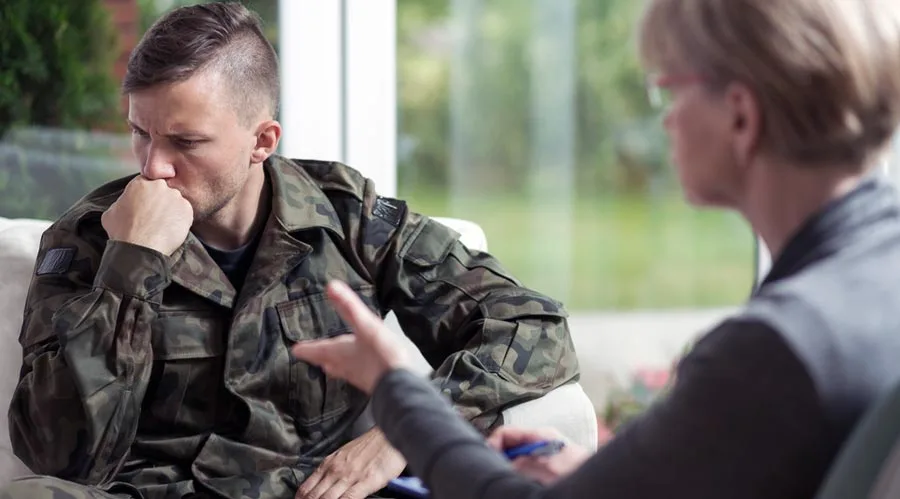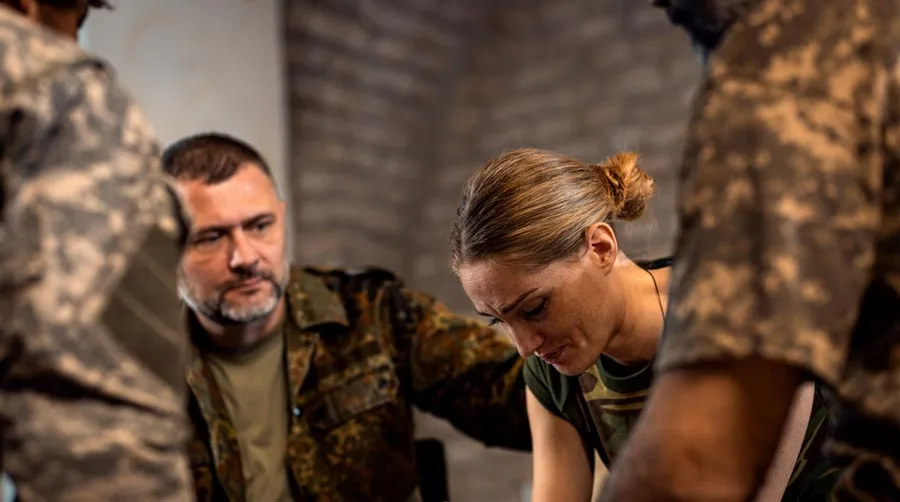South Shores Offers Programs for Dual Diagnosis Using TRICARE
Can you picture a room full of 121 people?
It’s not a small group by any means. With this in mind, consider the following statistic:
Since 2020, an average of 121 past and present military service members have committed suicide – every single day.
Although there is no official data, we can’t help but assume that a large portion of these suicides had ties to some form of mental health concerns, substance abuse disorders, or both. This should paint a vivid picture regarding the importance of TRICARE Addiction treatment and dual diagnosis therapy for veterans and their families.
Yet many members of our Armed Forces are left wondering, ‘Does TRICARE cover dual diagnosis treatment?’
At South Shores, the answer is a resounding affirmative! Our upscale treatment facilities in Dana Point recognize the urgency for such services and is leading the charge on the front lines in California – the state with the highest number of veterans suffering from mental health disorders, and homelessness as a result of their condition.
South Shores Detox in Dana Point not only accepts TRICARE Coverage but also provides treatment specifically aimed at trauma-related disorders – one of the most common forms of mental illness plaguing our country’s veteran population.
Substance Abuse Treatment and Using TRICARE Coverage
When you decide to address mental health and substance use disorders, an integrated approach to treatment is necessary to cover every aspect of your addiction and specific disorder. TRICARE coverage offers different plans for those entering addiction treatment who simultaneously face mental health challenges.
Finding the right facility that offers mental health services in combination with addiction treatment is the go-to option for co-occurring disorders. Inpatient treatment is generally the preferred, and most effective course of action.
This article highlights the process of dual-diagnosis addiction treatment for those with TRICARE coverage for drug rehab. By the time you’re finished reading, you’ll be better prepared for entering this specific form of mental health treatment, and how to go about discovering your coverage limits, copayments, and other costs.
What Is TRICARE Coverage for Addiction Treatment?
TRICARE coverage, otherwise known as TRICARE Insurance, is a specific type of mental health and addiction treatment service for past and present members of the United States Military. When veterans have TRICARE Health Insurance, a certain standard of service is guaranteed.
Ultimately, this means recipients of TRICARE Health Insurance receive top-tier services because of their unwavering dedication and service to our country. This robust form of TRICARE Insurance is extended to:
- Active duty members
- Veterans
- Immediate family of veterans
What Mental Health and Addiction Treatment Facilities Accept TRICARE Insurance?
Because TRICARE Insurance is a global entity that serves veterans in multiple countries, it’s accepted at many substance abuse and mental health treatment facilities. However, not all are equal, and South Shores Detox is proud to be an in-network provider for TRICARE (and associated policies administered by TriWest Insurance as well).
Some of the main behavioral health services covered under TRICARE Insurance are alcohol rehab and drug abuse treatment, as well as dual diagnosis addiction treatment.
This specialized form of therapy for substance use disorders targets the addiction itself, combined with underlying mental health disorders. Access to this form of addiction treatment is imperative for past and present members of the US Military, especially considering the number of substance abuse challenges that are accompanied by mental health disorders like PTSD, depression, and anxiety.
Does TRICARE Cover Dual Diagnosis Treatment Programs?
The life of any military personnel, past or present, is no walk in the park. Aside from the grueling schedule and overall demands of the military, the job also puts a strain on relationships and the personal lives of the men and women in these positions.
Service members are often estranged from their immediate family for months at a time. Marriages and relationships with significant others can suffer damage because of a lack of direct communication. Holidays and big events are missed, often driving a wedge between loved ones.
In more intense situations, veterans who experience the horror of live combat often return home with permanent wounds of the mental variety. And while it may seem that mental wounds are a welcome trade-off as opposed to physical ones – mental damage can take much longer to heal than any physical trauma.
For Many Veterans Self-Medicating Is a Form of Substance Abuse
Because veterans are often encouraged to wear a mask and shield their innermost feelings, dealing with depression and anxiety is challenging. This leads to compound issues, and many service members fall victim to some form of substance use disorder.
This works as a two-headed monster. Some members use their substance use disorder as a form of self-medication to handle feelings of panic and anxiety. On the other side of the coin, we have veterans who suffered significant physical trauma – either as a result of being wounded in combat, or simple wear and tear over the course of a long, physically demanding career.
Staggering Data About PTSD and Our Armed Forces
Perhaps some of the most staggering data regarding substance use, veterans, and dual diagnosis comes from a survey conducted in 2009. During that year, physicians at the VA Medical Clinics nationwide wrote a total of 3.8 million prescriptions for opioid painkillers.
Whether it’s chronic pain or sudden, intense trauma, it’s extremely common for veterans who were once prescribed pain medication to turn to alcohol or illicit opioids to deal with ongoing pain.
Ultimately, one generally gives way to the other, and substance abuse issues lead to mental health challenges or vice versa. When covered veterans or active duty military members seek treatment, TRICARE dual diagnosis treatment coverage is the light at the end of the tunnel, providing alternative therapies and residential treatment these men and women desperately need.
What should service members expect during TRICARE addiction treatment for dual diagnosis and mental health conditions?
Dual Diagnosis Substance Abuse Treatment for Our Veterans
What happens during dual diagnosis treatment? Although every case is different thanks to personalized treatment options, here’s a detailed example of the average client’s experience with dual diagnosis treatment at South Shores Detox.
Treatment Addresses Substance Abuse and Mental Health
It’s important to understand that dual diagnosis addresses substance abuse disorders and mental health challenges. This includes treatment for PTSD, anxiety, depression, and other disorders.
You Help Shape Your Treatment Experience
During your time at South Shores Detox, you share in the decision-making process and remain actively involved in setting and tracking goals and hashing out strategies that lead to positive change. Treatment moves at a pace that you’re comfortable with, ensuring that you get the maximum benefit from your time with us.
Education That Walks With You in Early Recovery
Treatment entails general education regarding mental health disorders and substance abuse. It may seem basic, but having solid foundational knowledge regarding the science of addiction and mental health is the primary building block to recovery.
Learning New Coping Strategies to Prevent Relapse
You’ll learn new coping strategies to help minimize the need for substance and strengthen your willpower. This also helps mend relationships and allows you to cope with anxiety, stress, and depression more productively. Instead of reaching for your drink or drug of choice when you experience negative thoughts or emotions, you’ll learn to reinforce your conviction with positive aspirations and forward progress.
Preparing for Dual Diagnosis Treatment at South Shores
Consider the following points regarding dual diagnosis treatment to prepare yourself for your inpatient experience at South Shores:
- Consider the role that your addiction has played throughout your life. This should be done in a meditative way. Even though conducted in silence, it prepares you for issues you might want to discuss when you finally have counselors and peers to engage with.
- Be prepared to learn more about drugs and alcohol. You may think you have a formal education in substance abuse but be prepared to learn new things about how substances interact with your mental health challenges.
- Start setting goals for yourself. This can include employment goals, relationship goals, or personal goals like fitness, hobbies, and other areas of focus.
- Consider involving your family in the benchmarks for your success. After you exit treatment, it’s important to continue to stay proactive, and having a solid support system is critical. Whether it’s parents, brothers, sisters, or significant others, having someone to help you during your journey will have a lasting impact on your success.
- Get rid of predispositions. Get rid of anything you thought you knew about conventional drug rehab treatment. At South Shores Recovery, we offer a fresh outlook on the recovery process and strive to infuse new and fresh ideas into our program.
TRICARE and South Shores: Paving the Way to Recovery
If you have any concerns regarding your TRICARE coverage, leave it up to us. Contact a member of our admissions team for a short consultation and we’ll handle the rest. We’ll set you up with a date for admission.
All that we ask is you bring yourself, an open mind, and a positive outlook. At South Shores Detox, we’re excited about your future, and we believe you should be as well. Don’t hesitate – contact us today to find out more about our program and take a huge stride toward lasting recovery!




